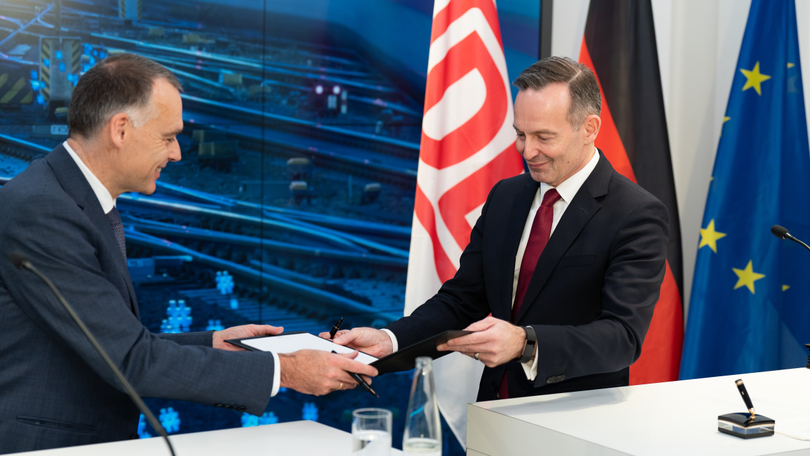
Source: BMDV
The Federal Ministry for Digital and Transport (BMDV) and Deutsche Bahn (DB) are jointly driving forward the planning for the ‘Digital Rail Germany’ programme. Federal Minister of Transport Dr Volker Wissing and Berthold Huber, Member of the DB Management Board for Infrastructure, signed the corresponding agreements in Berlin today. The volume of an existing financing agreement is increased from approx. €1.7 billion to approx. €2.7 billion. Moreover, DB has obtained the Federal Government’s commitment to continue to fund the planning of several projects from the starter package.
In the long term, all lines and rail hubs are to be equipped with the European Train Control System (ETCS) as well as digital signal boxes, completely replacing the old technology. The objective of the upgrading measures: more space for trains, a higher level of punctuality and fewer disruptions due to intelligently interconnected data from infrastructure and vehicles. In the future, this will enable DB to completely reorganize operations in the rail network and increase capacity by up to 35%.
Federal Minister Dr Volker Wissing:
If we want to achieve our climate change targets, we quickly need more capacity in rail transport. We want to make the railways the climate neutral backbone of our transport system. Besides rehabilitation as well as new construction and upgrading, digital transformation is a key element here. With the agreements concluded today, we are creating the financial basis for introducing ETCS while at the same time modernizing and digitalizing the existing signal boxes in Germany. This will immediately boost the capacity of the existing system and thus quickly lead to more rail services.
Berthold Huber, Member of the DB Management Board for Infrastructure:
Given the increasing traffic volume, we need to become faster in making our rail network more effective and efficient. In the medium and long term, we will focus on upgrading and new construction projects as well as on carrying out general rehabilitation measures on important corridors. The digital transformation of the infrastructure is crucial for this. With the digital rail operations of the future, we will be able to put more trains onto the climate-friendly railways without the expensive and complex construction of new tracks. The agreements reached with the Federal Government will therefore decisively advance Digital Rail Germany.
Digital transformation boost for rail freight corridors
The funds made available now will be used, among other things, to modernize and digitalize the infrastructure on the Rhine-Alpine freight corridor. This mainline from the Dutch North Sea ports to Italy is to be equipped with the European Rail Traffic Management System (ERTMS). This system will make a significant contribution to facilitating cross-border rail services in Europe. So far, locomotives and multiple units have had to be equipped with a variety of national safety systems. This will no longer be necessary in the future thanks to ERTMS.
Moreover, DB can invest around €307 million in the further planning for the Scandinavian-Mediterranean corridor (ScanMed). This European corridor, which is also important for rail freight, is to be fully equipped with ETCS between Denmark and Austria by the end of 2030. This concerns a total of 4,500 kilometres of line.
Stuttgart digital hub: metropolitan region as a global leader
A further €83 million are available for planning the third building block of the Stuttgart digital hub. By 2030, rail operations are to be controlled by digital technology also in the urban hinterland of Stuttgart beyond the end points of the rapid transit lines. The core hub is scheduled to start operation with ETCS without signals together with Stuttgart 21 as early as 2025 - making the metropolitan region a global leader.
Around €11 million of planning resources are earmarked for the Cologne - Frankfurt/Main high speed line. DB intends to equip around 200 km of line with ETCS and digital signal boxes by 2028. This measure will increase the quality and efficiency of rail operations. At the same time, it will be possible to completely replace facilities prone to disruption and older signal boxes.
Further information and facts on the ‘Digital Rail Germany’ programme can be found at:https://digitale-schiene-deutschland.de/